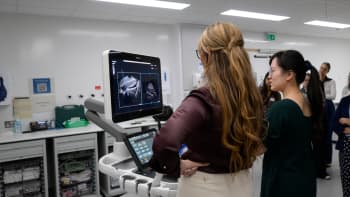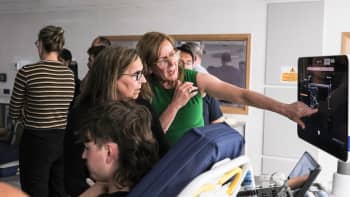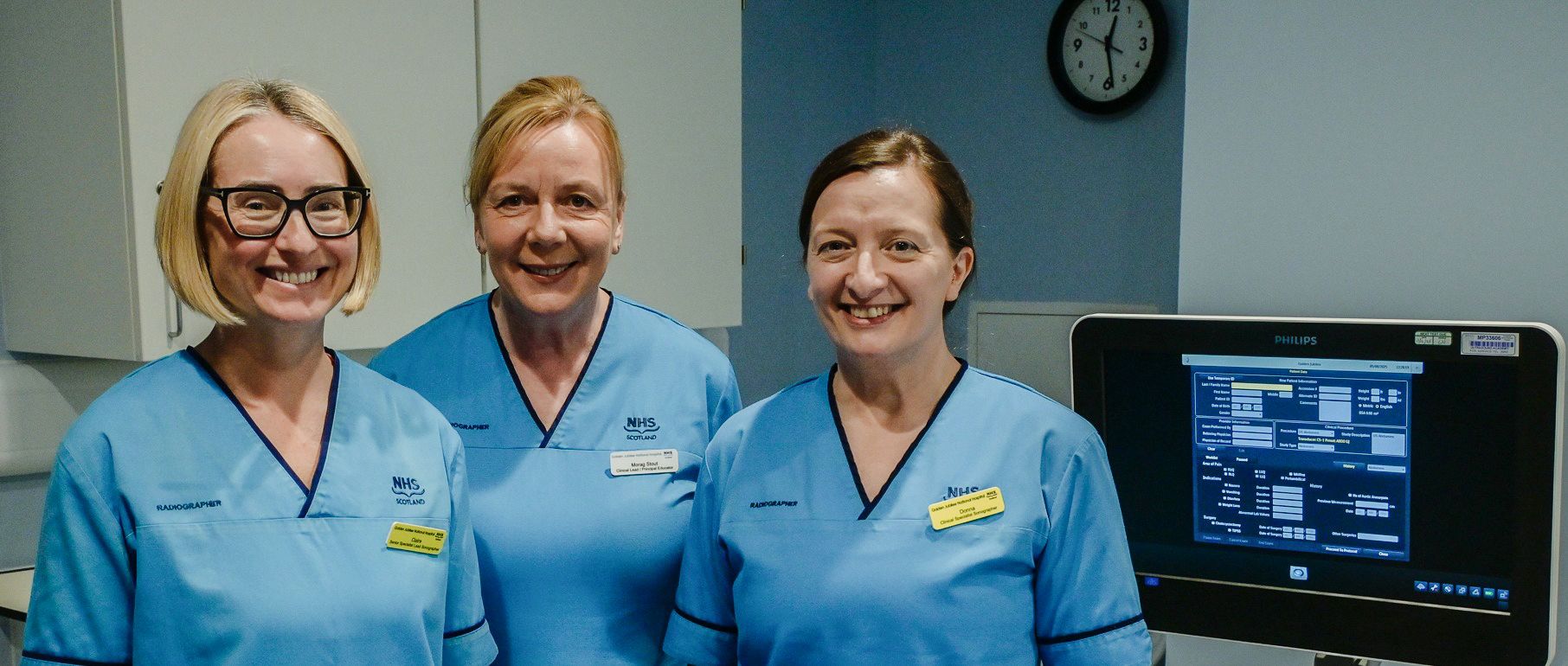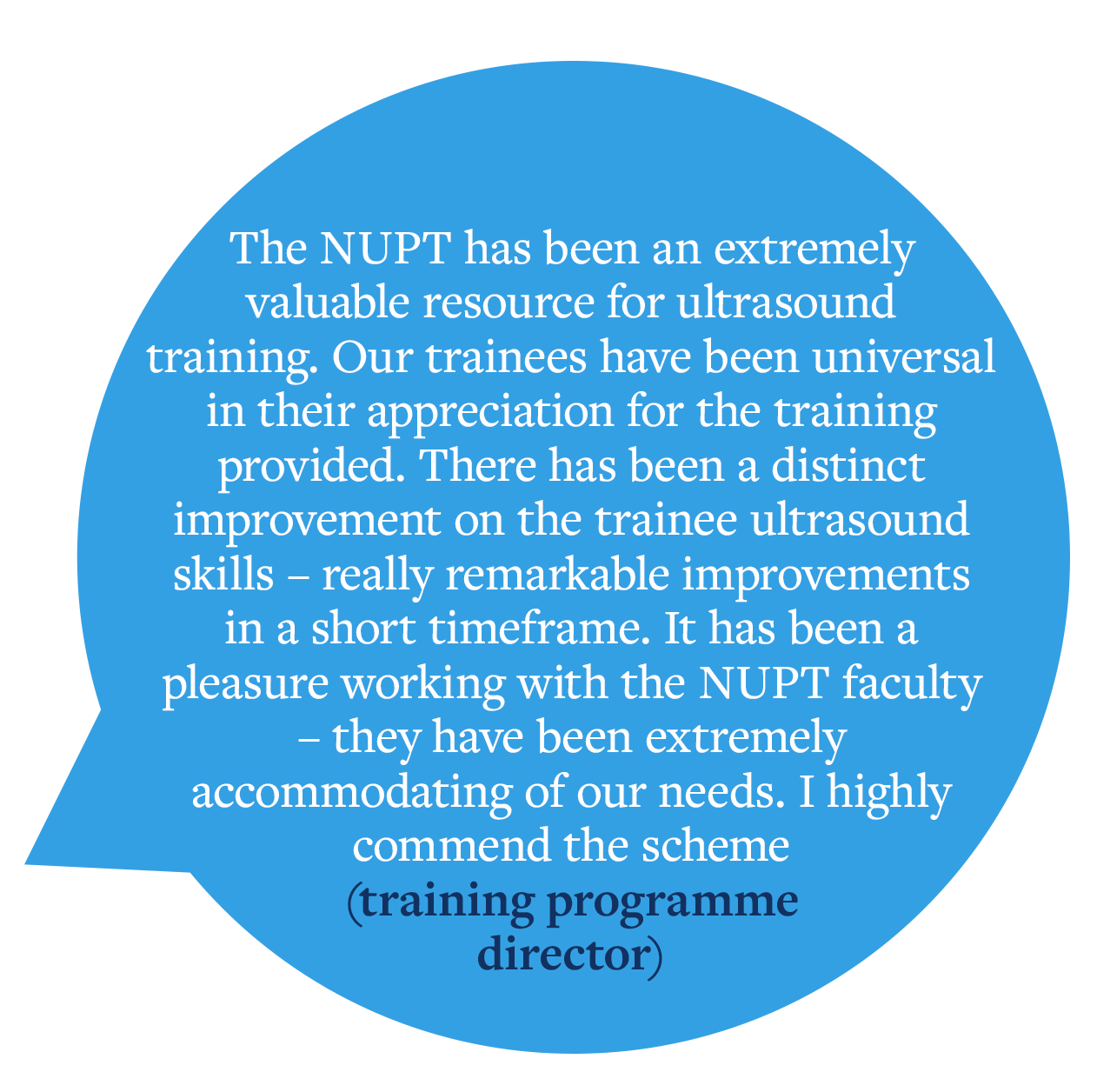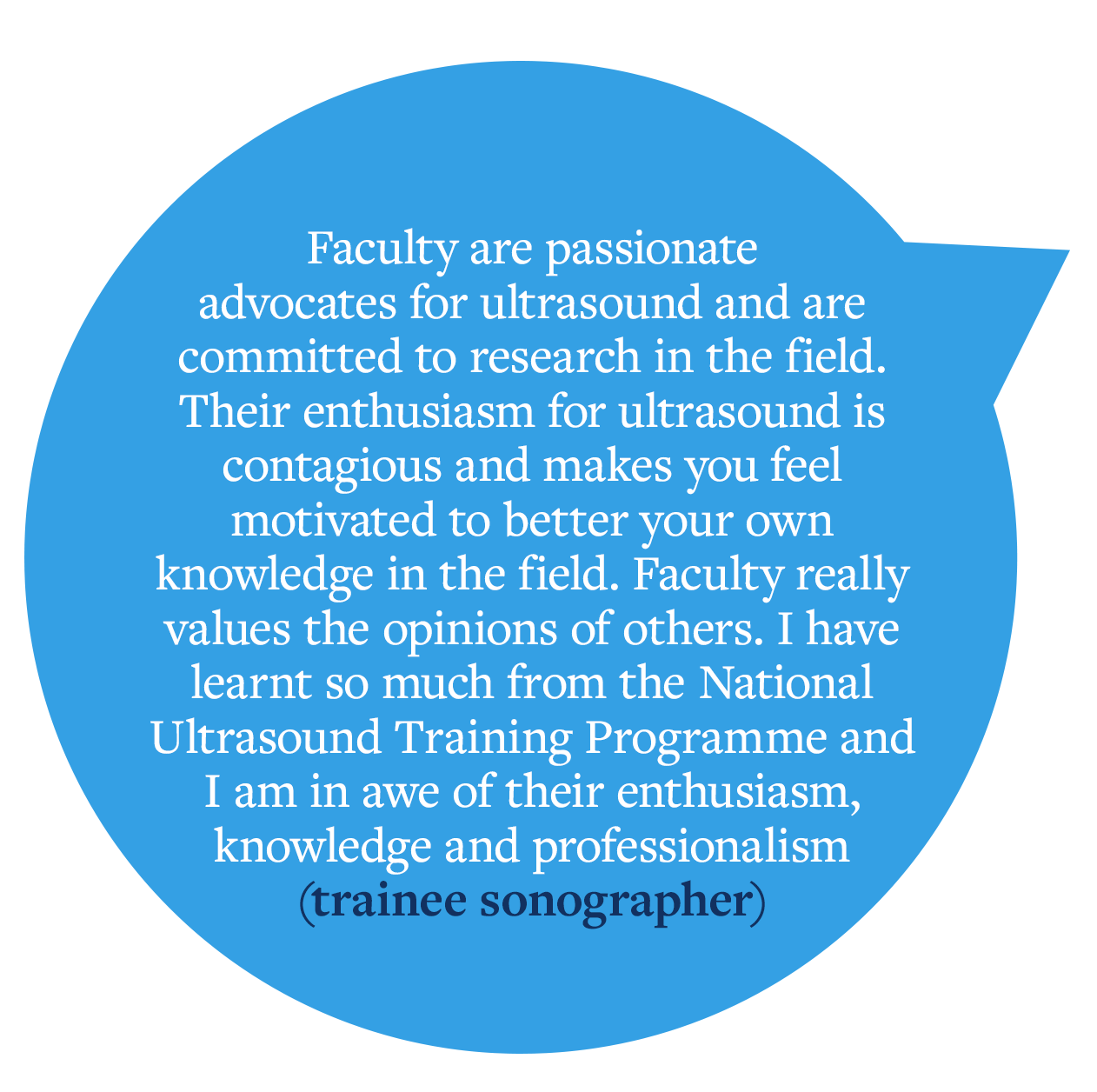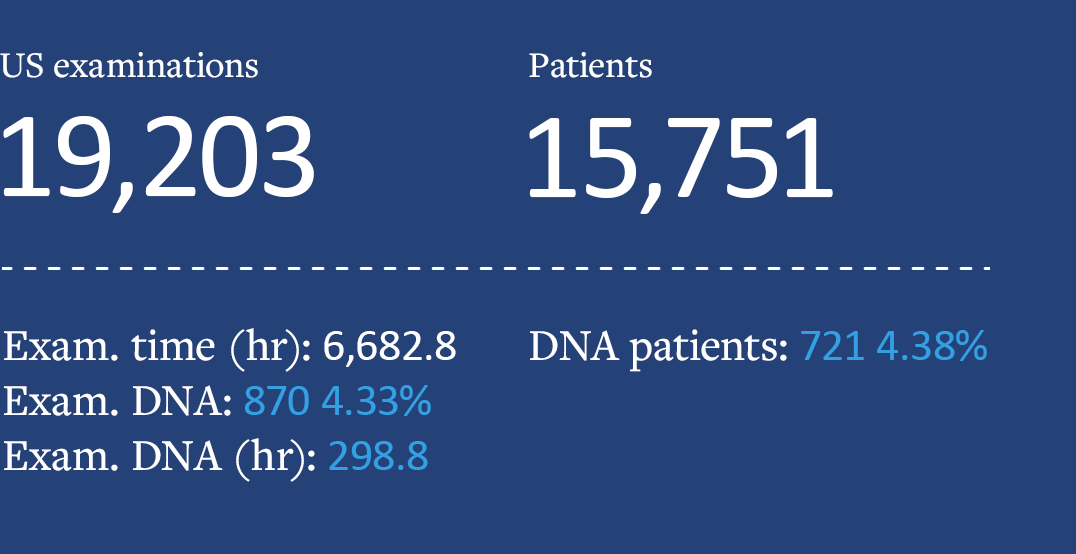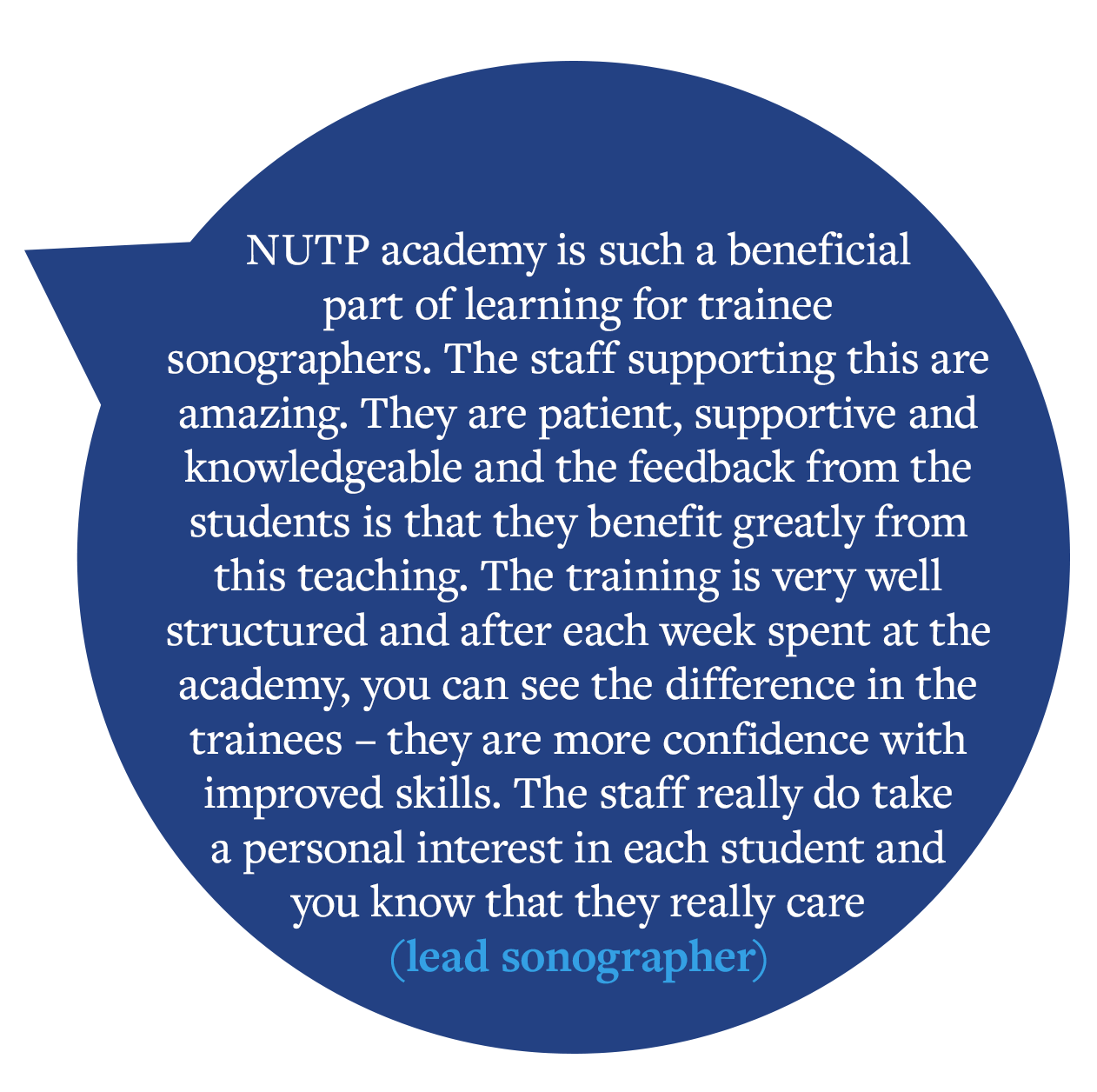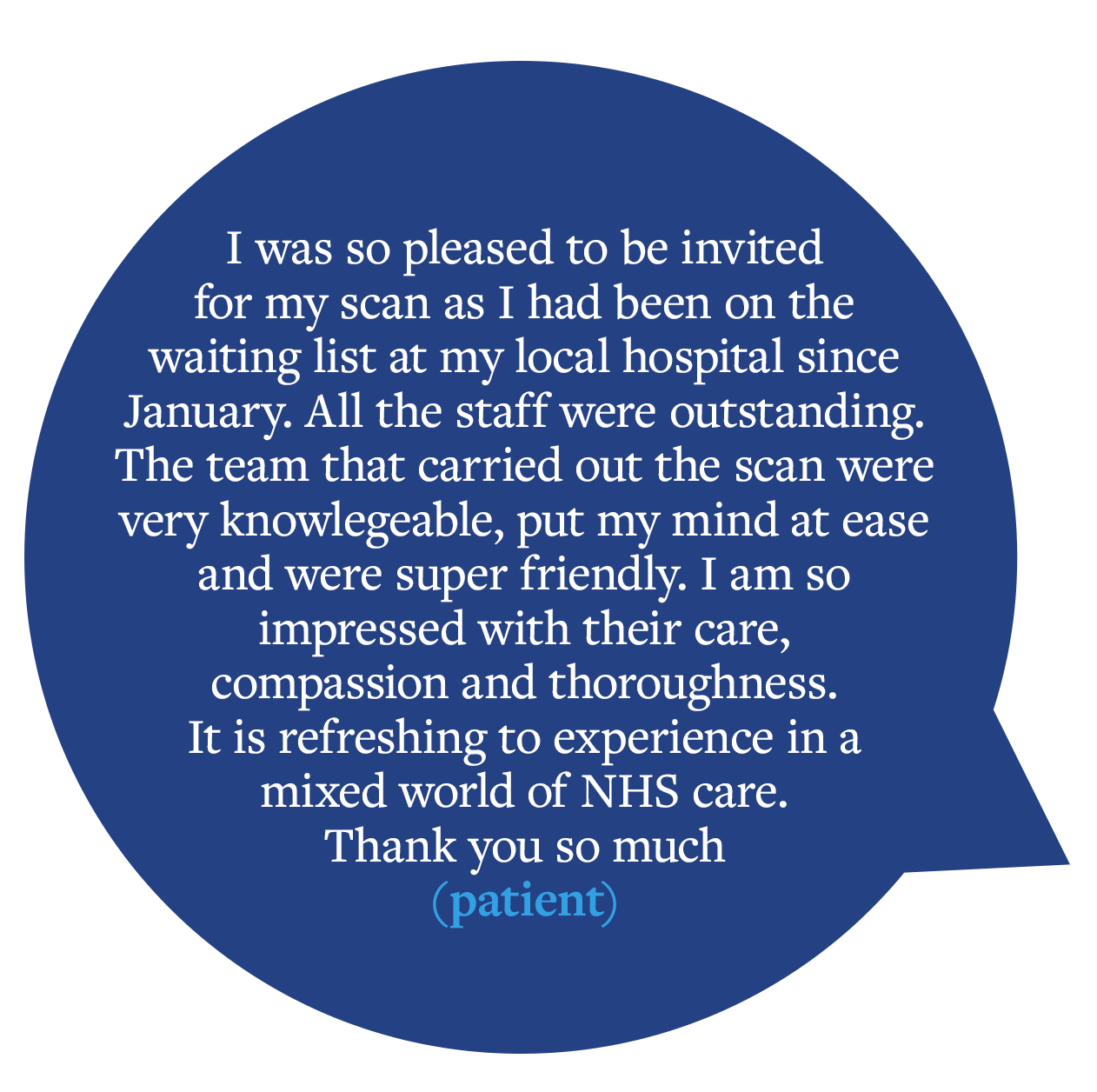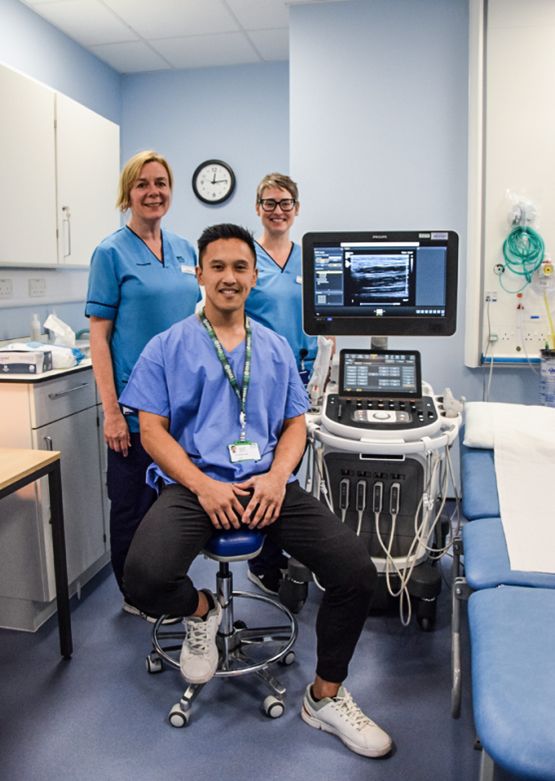Scotland’s National Ultrasound Training Programme: developing a ‘creative, supportive and empowering culture’
Morag Stout, clinical lead for Scotland’s National Ultrasound Training Programme, shares her reflections on the successes and challenges that came alongside the scheme’s drive to transform training in ultrasound
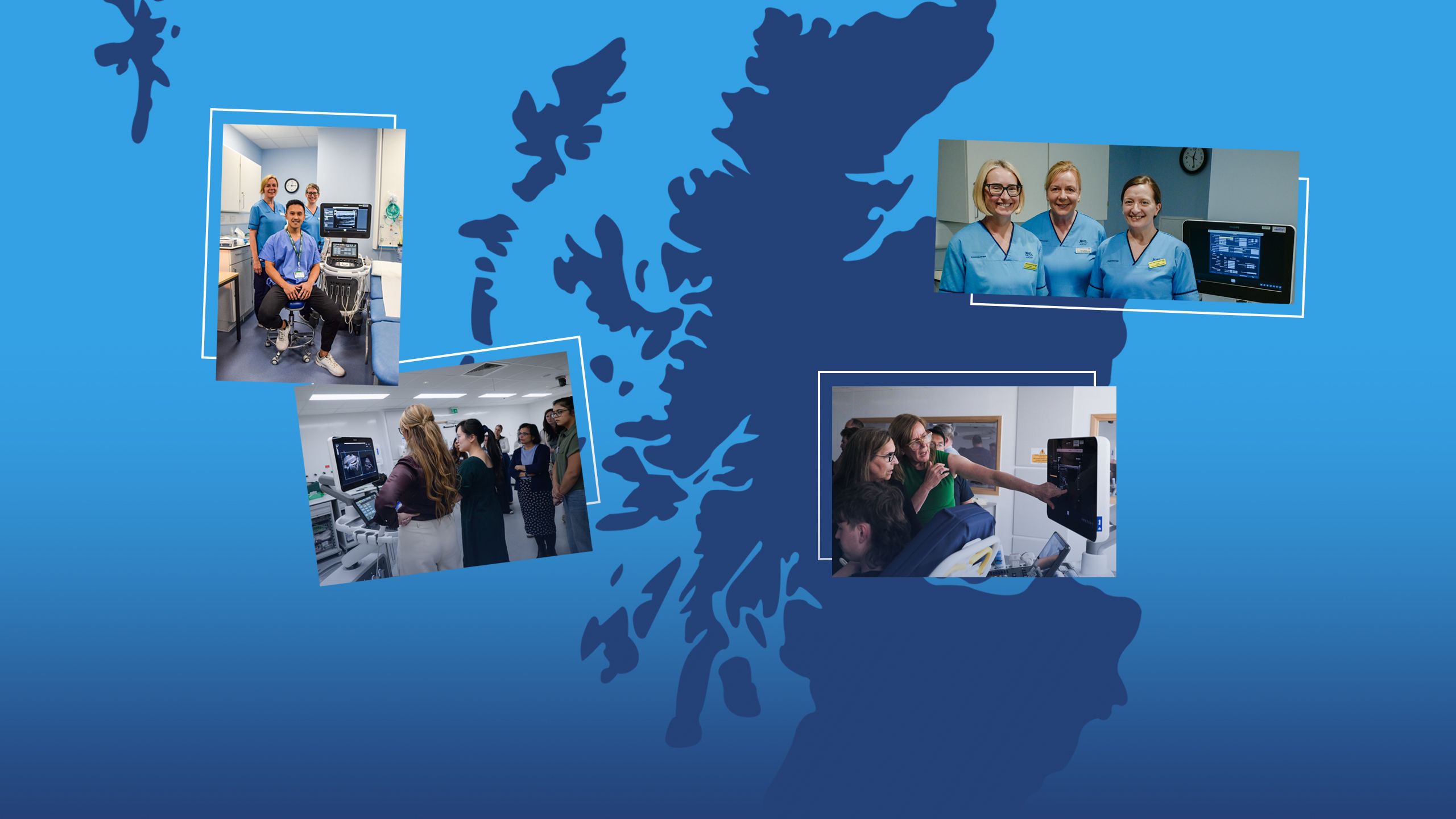
Scotland’s National Ultrasound Training Programme: developing a ‘creative, supportive and empowering culture’
Morag Stout, clinical lead for Scotland’s National Ultrasound Training Programme, shares her reflections on the successes and challenges that came alongside the scheme’s drive to transform training in ultrasound

The rising demand for medical ultrasound, coupled with a well-documented national shortage of sonographers, prompted the Scottish Radiology Transformation Programme (SRTP) to undertake a comprehensive survey in 2021 to assess ultrasound demand, capacity and workforce across Scotland.
The findings were striking across all 14 Scottish health boards: there was a sonographer vacancy rate of 13 per cent, with 12 per cent of the workforce planning to retire within three years. Recruitment efforts were proving challenging, with boards increasingly dependent on locum staff to manage waiting lists even before the Covid pandemic. Alarmingly, trainee numbers did not align with the projected workforce deficit. In addition, boards reported a significant “training burden”, citing increased patient throughput and limited dedicated training time, factors that intensified pressures on existing staff. These findings underscored an urgent need to expand the sonography workforce nationwide.
To address this, NHS Scotland Academy (NHSSA) – an innovative partnership between NHS Golden Jubilee and NHS Education for Scotland (NES) – was established to support the transformation and sustainability of the health and social care workforce through accelerated, needs-driven education and training.
NHSSA spearheaded the development of the National Ultrasound Training Programme (NUTP), leading the initiative from concept to delivery. This collaborative effort brought together NES, NHS Golden Jubilee University National Hospital (GJUNH), SRTP, Glasgow Caledonian University and the Scottish government, culminating in the launch of NUTP in November 2022.
GJUNH, Scotland’s National Waiting Times Centre, provides high-quality specialist and elective care across orthopaedics, heart and lung, ophthalmology and diagnostics. Its national portfolio encompasses the GJUNH, NHSSA, National Centre for Sustainable Delivery (CfSD), Golden Jubilee Research Institute and Golden Jubilee Conference Hotel.
Located in a modern, purpose-built facility, the campus uniquely integrates elective hospital services with hotel and conference amenities, alongside centres for research, clinical skills and innovation. The NHSSA model, which is rooted in continuous learning and strengthened by close ties with academia and industry, creates a dynamic environment for innovation and a robust network for the dissemination of best practices.
As part of NUTP, GJUNH provided dedicated facilities, including two fully equipped ultrasound rooms, with training delivered to patients awaiting ultrasound examinations from across Scotland.
The programme’s initial goal was to train 12 general medical sonographers representing multiple Scottish health boards, from the Borders to Grampian. Each trainee held a substantive NHS Scotland training post, was enrolled in a Consortium for the Accreditation of Sonographic Education course at a higher education institution and had a named mentor within their home board.
For those travelling from more distant regions, discounted accommodation was available at the Golden Jubilee Hotel. Importantly, NUTP training is offered free of charge to all NHS Scotland boards, and its delivery is supported by a faculty of four highly experienced sonographers.
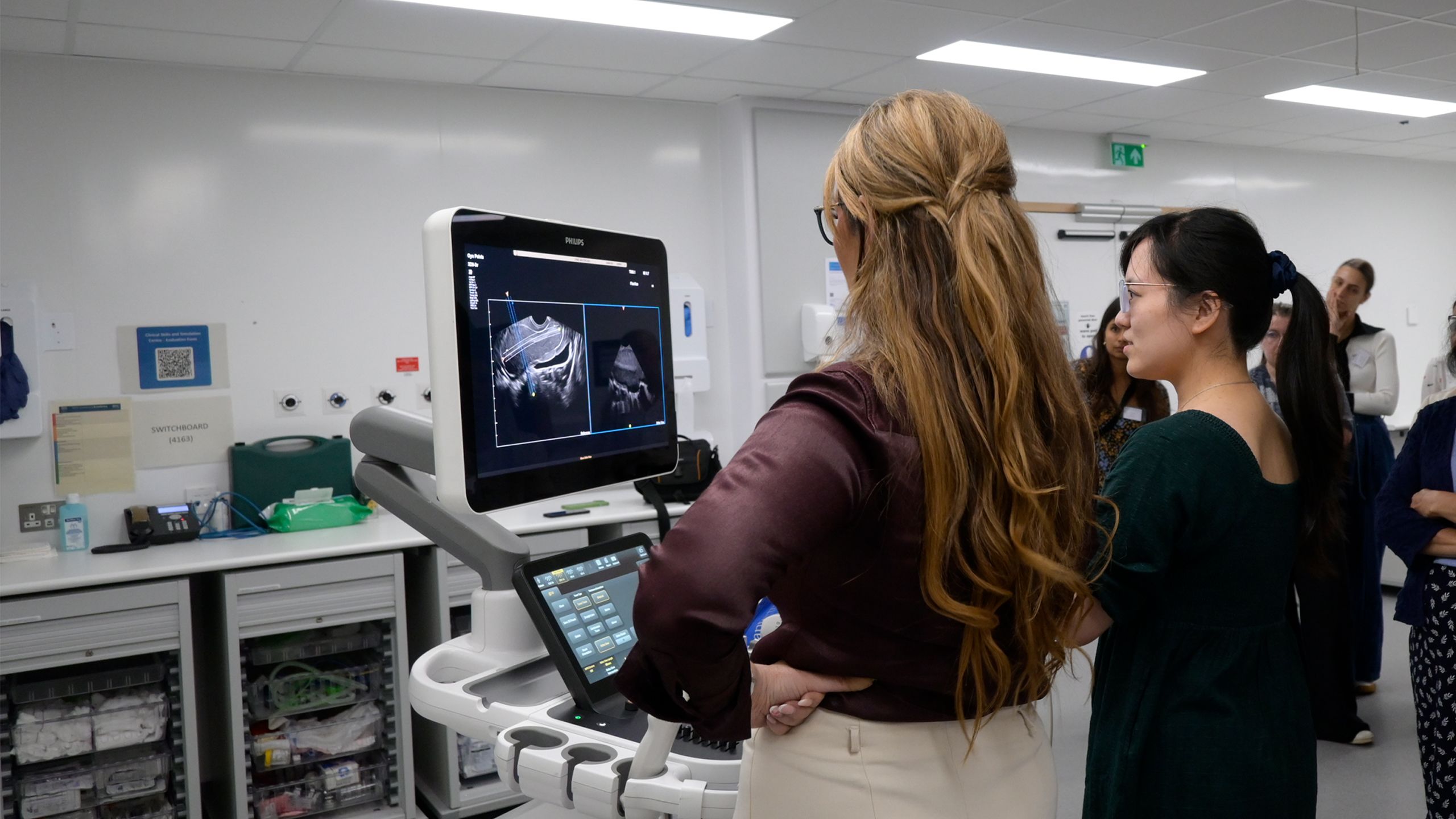
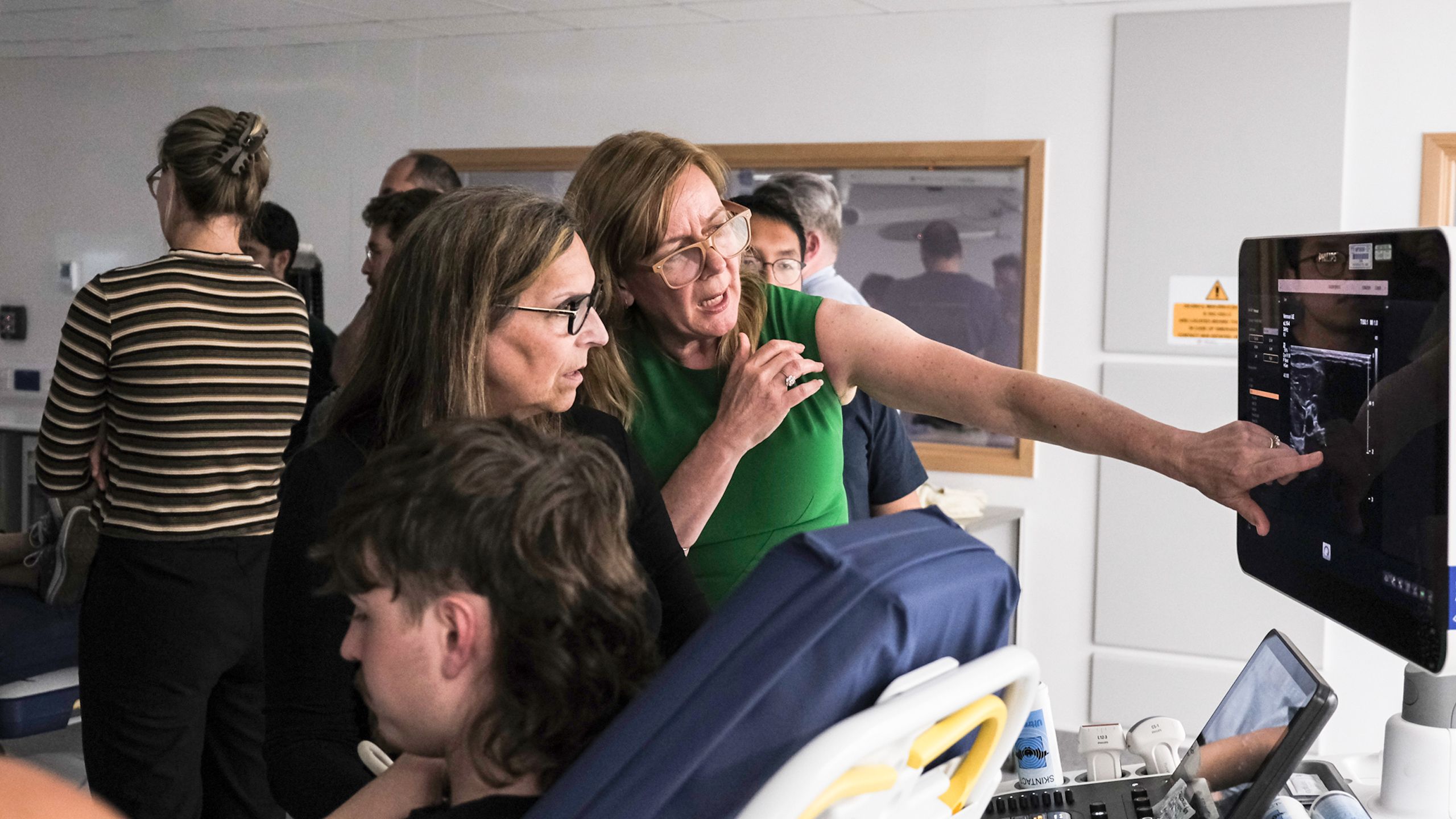
Programme evolution: interprofessional learning and immersive masterclasses
Building on its core sonography training, NUTP broadened its scope in spring 2023, welcoming qualified sonographers seeking to upskill within their respective specialties. In collaboration with medical deaneries, the programme also began offering three to four-day focused training blocks for resident doctors in sexual and reproductive health (SRH) and radiology from summer 2023 onwards.
By December 2023, CfSD identified a pressing need to improve diagnostic access for head and neck pathologies. In response, NUTP expanded its curriculum to include specialist training in neck ultrasound, fine needle aspiration and biopsy.
As demand for advanced ultrasound education continued to grow, NUTP secured funding to expand both its facilities and faculty for 2024-25. This enabled the addition of a third dedicated training room and, by summer 2024, the programme welcomed its first obstetrics and gynaecology (O&G) resident doctor learners. The following autumn saw an even more diverse intake, including O&G sonographers, SRH specialty doctors and gynaecology nurses, as well as learners with podiatry and physiotherapy backgrounds.
NHSSA’s state-of-the-art simulation suite and classroom at GJUNH further strengthened the programme’s educational capabilities. Leveraging these resources, the NUTP faculty designed immersive one-day multidisciplinary masterclasses, with the inaugural session held in May 2024. These masterclasses aim to provide participants with a comprehensive overview of a topic, equipping them with the confidence to attempt examinations under supervision.
Offered free of charge to all learners, the sessions holistically cover themes such as upper limb doppler ultrasound. Expert speakers from multiple disciplines contribute to the programme, with a strong emphasis on hands-on scanning using live models (and simulation for gynaecology).
Programme evolution: interprofessional learning and immersive masterclasses
Building on its core sonography training, NUTP broadened its scope in spring 2023, welcoming qualified sonographers seeking to upskill within their respective specialties. In collaboration with medical deaneries, the programme also began offering three to four-day focused training blocks for resident doctors in sexual and reproductive health (SRH) and radiology from summer 2023 onwards.
By December 2023, CfSD identified a pressing need to improve diagnostic access for head and neck pathologies. In response, NUTP expanded its curriculum to include specialist training in neck ultrasound, fine needle aspiration and biopsy.
As demand for advanced ultrasound education continued to grow, NUTP secured funding to expand both its facilities and faculty for 2024-25. This enabled the addition of a third dedicated training room and, by summer 2024, the programme welcomed its first obstetrics and gynaecology (O&G) resident doctor learners. The following autumn saw an even more diverse intake, including O&G sonographers, SRH specialty doctors and gynaecology nurses, as well as learners with podiatry and physiotherapy backgrounds.
NHSSA’s state-of-the-art simulation suite and classroom at GJUNH further strengthened the programme’s educational capabilities. Leveraging these resources, the NUTP faculty designed immersive one-day multidisciplinary masterclasses, with the inaugural session held in May 2024. These masterclasses aim to provide participants with a comprehensive overview of a topic, equipping them with the confidence to attempt examinations under supervision.
Offered free of charge to all learners, the sessions holistically cover themes such as upper limb doppler ultrasound. Expert speakers from multiple disciplines contribute to the programme, with a strong emphasis on hands-on scanning using live models (and simulation for gynaecology).
Some of the National Ultrasound Training Programme faculty (L-R: Claire Lindsay, senior specialist lead sonographer, Morag Stout, clinical lead/principal educator (sonography), Donna Meahan, senior sonographer)
Some of the National Ultrasound Training Programme faculty (L-R: Claire Lindsay, senior specialist lead sonographer, Morag Stout, clinical lead/principal educator (sonography), Donna Meahan, senior sonographer)
The masterclasses have been exceptionally well received and continue to grow in popularity. In 2025, the portfolio is set to expand further, featuring new topics such as renal transplant ultrasound, staff wellbeing, shoulder imaging and soft tissue masses.
In June 2025, NUTP hosted its first interprofessional learning week, offering pre-registration NMAHP (nursing, midwifery and allied health professional) learners an ultrasound taster day – another step in fostering early engagement and interest in sonography. The programme continues to thrive, supported by outstanding feedback from learners, patients and training programme directors.
Since its inception, NUTP has worked in close partnership with Planned Care at the Scottish government to ensure that learners receive tailored training lists aligned with their individual development needs, while simultaneously prioritising appointments for patients who have been waiting the longest for specialist ultrasound services.
The faculty has flourished, honing its expertise not only in clinical education but also in writing, presenting and research, making significant contributions to numerous national forums and events.
The masterclasses have been exceptionally well received and continue to grow in popularity. In 2025, the portfolio is set to expand further, featuring new topics such as renal transplant ultrasound, staff wellbeing, shoulder imaging and soft tissue masses.
In June 2025, NUTP hosted its first interprofessional learning week, offering pre-registration NMAHP (nursing, midwifery and allied health professional) learners an ultrasound taster day – another step in fostering early engagement and interest in sonography. The programme continues to thrive, supported by outstanding feedback from learners, patients and training programme directors.
Since its inception, NUTP has worked in close partnership with Planned Care at the Scottish government to ensure that learners receive tailored training lists aligned with their individual development needs, while simultaneously prioritising appointments for patients who have been waiting the longest for specialist ultrasound services.
The faculty has flourished, honing its expertise not only in clinical education but also in writing, presenting and research, making significant contributions to numerous national forums and events.
Challenges
Initial funding for NUTP was secured on a non-recurrent basis, presenting significant challenges in faculty recruitment because of the reliance on fixed-term contracts and secondments. Some health boards were unable to release staff on a secondment basis, and the requirement to prepare a new business case for each financial year created uncertainty that proved difficult for faculty members. Encouragingly, recurring funding has now been secured, providing greater stability and sustainability for the programme.
Effective communication of the work undertaken by NHSSA and NUTP remains essential in fostering trust and engagement across stakeholders.
Identifying appropriate space to accommodate the programme’s growing facilities has been, and continues to be, a complex challenge.
Successes
40
sonographers (NMAHPS) have completed training at NUTP
53
medics have completed training at NUTP
129
learners have attended NUTP’s masterclasses
15,751
patients from the national waiting list have attended NUTP since inception
97.7%
Patients report a 97.7 per cent satisfaction rate with the service
4.3%
Introduction of patient-focused booking has reduced did not attend (DNA) rates from 7 per cent to 4.3 per cent
✓
Opportunities for research with learners from NUTP and partner institutions
✓
NUTP has established a national Gynaecology Reference Group to provide more consistency in the reporting of gynaecological examinations
US examinations
Examination data comes from the Radiology Information System (RIS). Patients sometimes have multiple examinations performed in one attendance. New data now captures time weighted examinations (or number of hours performing scans) and DNA rates per exam and board.
RIS recorded 19,203 completed examinations, 870 (4.33 per cent) examinations were recorded as DNA. 15,751 patients attended, 721 (4.38 per cent) of all patients booked in were recorded as DNA.
|
Health board |
US examinations |
Exam. DNA % |
Patients |
|---|---|---|---|
|
NHS Ayrshire and Arran |
1,202 |
3.92 |
1,023 |
|
NHS Borders |
5 |
4 |
|
|
NHS Dumfries and Galloway |
2 |
1 |
|
|
NHS Fife |
1 |
1 |
|
|
NHS Forth Valley |
1,519 |
3.43 |
1,218 |
|
NHS Grampian |
310 |
2.82 |
203 |
|
NHS Greater Glasgow and Clyde |
7,943 |
4.30 |
6,616 |
|
NHS Highland |
62 |
3.13 |
46 |
|
NHS Lanarkshire |
7,073 |
4.79 |
5,808 |
|
NHS Lothian |
911 |
4.11 |
694 |
|
The Golden Jubilee |
175 |
2.23 |
137 |
|
Total |
19,203 |
4.33 |
15,751 |
Illustration of the number of patients scanned and examinations performed since inception.
There are several academy models across the UK. Some train medics and sonographers separately. Many use only simulation, and some struggle to recruit or achieve recurring funding. NUTP sits firmly within NHSSA’s education and co-design philosophy, with stakeholder and partner co-design throughout. NUTP’s collaborative approach, clear co-design development principles and educational governance processes are exemplary.
We have a brilliantly talented, dedicated, dynamic, professional leadership and delivery team who are both positive and supportive. A creative, supportive and empowering culture has been cultivated to allow us all to thrive as a whole academy team.
NUTP within GJUNH is a fantastic environment to work, train and be cared for. NHSSA NUTP provides a wonderful compassionate culture in which to work, and our learners regularly comment on the affirmative environment the team have created. Interprofessional learning is integral to the programme and many of our learners contribute to our masterclasses.
We believe learning sonography requires a holistic approach from discussing clinical presentation, communication with the patient, caring for the patient, scanning, clinical decision making and reporting. We aim for our learners to leave feeling clinically competent, confident and engaged in optimal patient care and reporting.
Finally, in an NHS where access to funding can be challenging, NUTP has provided the government with an extremely good return on investment by scanning thousands of patients while focusing on clinical need and building a sustainable workforce.
Specialist trainee with Morag Stout (clinical lead) and Claire Lindsay (senior specialist lead sonographer)
Specialist trainee with Morag Stout (clinical lead) and Claire Lindsay (senior specialist lead sonographer)
There are several academy models across the UK. Some train medics and sonographers separately. Many use only simulation, and some struggle to recruit or achieve recurring funding. NUTP sits firmly within NHSSA’s education and co-design philosophy, with stakeholder and partner co-design throughout. NUTP’s collaborative approach, clear co-design development principles and educational governance processes are exemplary.
We have a brilliantly talented, dedicated, dynamic, professional leadership and delivery team who are both positive and supportive. A creative, supportive and empowering culture has been cultivated to allow us all to thrive as a whole academy team.
NUTP within GJUNH is a fantastic environment to work, train and be cared for. NHSSA NUTP provides a wonderful compassionate culture in which to work, and our learners regularly comment on the affirmative environment the team have created. Interprofessional learning is integral to the programme and many of our learners contribute to our masterclasses.
We believe learning sonography requires a holistic approach from discussing clinical presentation, communication with the patient, caring for the patient, scanning, clinical decision making and reporting. We aim for our learners to leave feeling clinically competent, confident and engaged in optimal patient care and reporting.
Finally, in an NHS where access to funding can be challenging, NUTP has provided the government with an extremely good return on investment by scanning thousands of patients while focusing on clinical need and building a sustainable workforce.
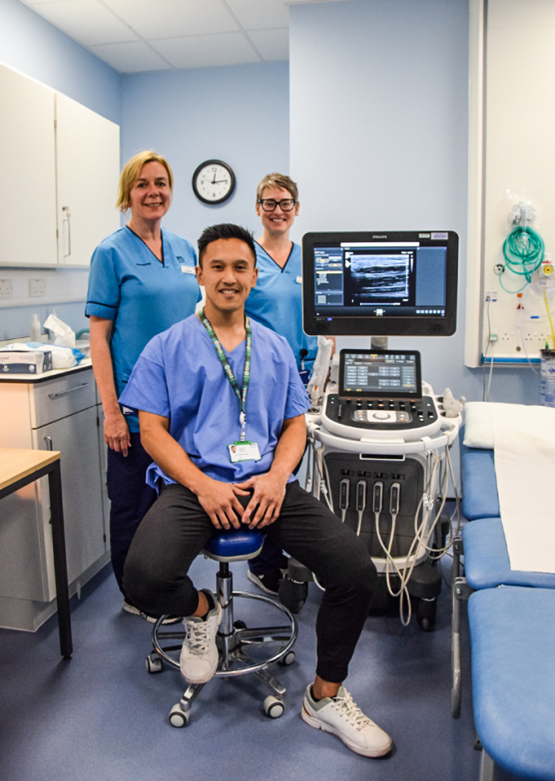
Successes and considerations
- Continue to collaborate with all stakeholders from inception and throughout, to support co-design and delivery.
- Integrate scanning on patients.
- Promote interprofessional education and a multiprofessional approach.
- Provide a holistic training, from clinical history to report.
- Diversify your programme to meet national clinical and educational needs.
- If accommodation is not available or travel is not feasible for learners, consider new ways of delivering training – can a travelling faculty deliver training at local sites?
For more information, please contact morag.stout@nhs.scot
More about ultrasound and the SoR
The Ultrasound Advisory Group (UAG) provides the Society and College of Radiographers with advice regarding strategic direction for the profession and the appropriate support to deliver service improvements within the interprofessional environment of ultrasound.
The remit of the group includes promoting SoR | CoR’s policies, strategies and publications within the context of ultrasound to the benefit of services, practitioners and patients.
Find out more about the UAG here.
Read more



